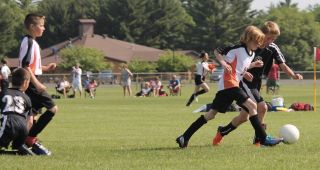Parenting
7 Ways to Burn Out Your Kids
Personal Perspective: Children are overloaded, and they're showing it.
Posted November 2, 2023 Reviewed by Gary Drevitch
I read an article recently about a high school senior who was accepted into a couple of Ivy League colleges with “only” a GPA of 3.8 and an SAT of 1390. While the article bemoaned the probability that her acceptance was facilitated by a background of privilege, what struck me was what a great candidate she seemed to be for any school. And it made me think about how desperately hard we’re pushing kids to hyper-achieve, and then wondering why they’re unhappy and perpetually stressed out. With this in mind, I came up with seven sure-fire ways in which we can prime our children for lasting burnout.
1. Insist on Superhuman Academic Achievement. What happened to a GPA of 4.0? And a time when a 3.8 was pretty darned good? Now you’re considered an underachiever if you don’t carve out a 4.4. Or a 4.6. I’ve even heard tell of schools extending GPAs into the fives. We no longer celebrate academic effort, intellectual curiosity, and cognitive development; we care only about performance. And, apparently, “perfect” performance is not good enough. So crank up those AP courses.
2. Buy Into the Inherent Superiority of “Elite" Colleges. We pressure our progeny to aspire only to the very “best” schools for their tertiary educations. We have them see anything less as abject failure—a ticket to nowhere. But do schools such as the Ivies truly offer a better education? Are the professors that much better, that much more invested in their students? Are the syllabi, the textbooks, and the curricula so markedly superior? If so, why are these institutions so stingy with their enrollments? All of them could double their class sizes without sacrificing the “quality” of their students. And they have the endowments to do so.
3. Allow Universities to Act as Filters for Graduate Schools. Rather than insisting that our universities focus on the development of critical thinking, scientific skepticism, team integration, leadership, creativity, and other crucial lifelong skills, we accept their subjecting our kids to slates of soul-crushing, dog-eat-dog, survival-of-the-most-driven, pre-professional curricula—featuring useless courses that are nothing but willful filters for the nation’s graduate schools (think organic chemistry). What drives this complicity with the professional schools’ admissions boards? Does success in these curricula predict future performance in a profession? And who is telling our kids that the only route to happiness is through a medical, law, or business school?

4. Demand Athletic Super-Specialization. Now, we mustn’t forget our kids’ extra-curriculars. Being a star athlete is gold. So, let’s funnel our children into hyper-focused athletic avenues to assure superlative performance in a single sport. We could even start them a year late in kindergarten to assure their maturational advantage. And let’s spend our “family time” in cars, carting them off to one distant “select” team competition or another, where we can castigate them for any subpar efforts. Never mind that this subjects their developing bodies to repetitive-use injuries, and their developing minds to athletic burnout.
5. Encourage “Cutting” of Kids From School Sports Teams. While we’re at it, let’s filter out the "underperformers" from scholastic athletics. Let’s brand said kids as not worthy of the time, effort, and resources (and pray our own kids make the cut). Never mind that children mature (physically and cognitively) at different rates. Never mind that school sports could be a driver of integrative and cooperative skill development, a builder of healthy habits, and a source of great fun, camaraderie, social development, inclusivity, and sense of belonging for all kids. Let's ignore that we live in an era of unprecedented adolescent isolation, loneliness, depression, anxiety, and suicide ideation, and make those cuts.
6. Push Them Into Community Service. Because being star pupils and athletes won’t be enough, let’s make sure we script out every remaining minute of our kids' childhoods with sundry “altruistic” resume-stuffers. Let’s drop them off at the local jail every weekend to teach reading skills and send them to underdeveloped nations every summer to build aqueducts. Never mind that they might not feel the calling just yet. Let’s go ahead and foster within them a mercenary attitude when it comes to reaching out to their fellow human beings—and teach them to always consider what’s in it for them.

7. Insist on Some "Adversity." And we mustn’t neglect our kids’ need to face adversity in their lives. It’s a keystone to every application they will ever encounter. Never mind that we know that suffering is individualized and cannot be plotted on a comparative scale. Never mind that there’s no evidence that facing adversity in childhood guarantees competent, caring, and charitable adult functionality. No, let’s insist that they need to somehow out-suffer their competition. Let’s make it clear that those who can’t relate tales of supreme deprivation, those who hail from protected and supportive environments, won't make the cut. So, let’s find some challenge, any challenge—no matter how cynical or contrived—for them to "overcome."
The Long Road
Our kids are travelers on a long and complex road to adulthood. They need social experiences. They need to explore. They need to mess up and reconfigure. They need to find their own inspirations, passions, and motivations, and to derive pride from their own achievements. How are they going to do this when we’ve entered them into a no-holds-barred grudge match for supposed future "success" in whch only performance beyond perfection is deemed acceptable, and every second of their days is spoken for and carefully choreographed? How will they learn to function as adults, make difficult decisions, tackle paradoxes and ethical dilemmas, grow in the face of disappointment and failure, integrate into a community, make friends, meet mates, and have fun?
References
McLeod, T., et al, (2023). Pediatric Health Care Provider Awareness, Perceptions, and Utility of Sport Specialization Recommendations J Athl Train (2023) 58 (7-8): 618–626. https://doi.org/10.4085/1062-6050-0477.22
Wilkins, S., et al, (2023) Motivation and Behaviors Related to Sport Specialization in College Baseball Players. J Athl Train (2023). https://doi.org/10.4085/1062-6050-0023.23
Youth Sport Specialization Safety Recommendations. NATA. https://www.atyourownrisk.org/sites/default/files/2022-10/yss_recommend…
Limberg, K., et al., (2017) The Relationship Between Perfectionism and Psychopathology: A Meta-Analysis. J Clin Psychol. 2017 Oct;73(10):1301-1326. doi: 10.1002/jclp.22435. Epub 2016 Dec 27. PMID: 28026869 DOI: 10.1002/jclp.22435
Grace, M. (2018) Depressive symptoms, burnout, and declining medical career interest among undergraduate pre-medical students. Int J Med Educ. 2018 Nov 26:9:302-308. doi: 10.5116/ijme.5be5.8131. PMID: 30481160 PMCID: PMC6387778 DOI: 10.5116/ijme.5be5.8131
Sorkkila, M., et al., (2017) A person-oriented approach to sport and school burnout in adolescent student-athletes: The role of individual and parental expectations. Psychology of Sport and Exercise.
Volume 28, January 2017, Pages 58-67 https://doi.org/10.1016/j.psychsport.2016.10.004
Wilbur, V., (2014) Burnout among high school students: A literature review. Children and Youth Services Review. Volume 42, July 2014, Pages 28-33 https://doi.org/10.1016/j.childyouth.2014.03.020


